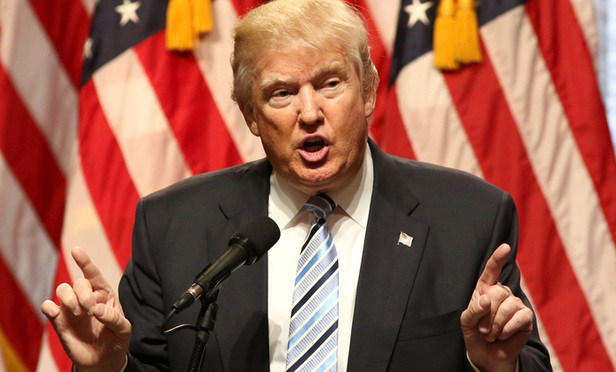'There's a direct negative impact on our clients' - lawyers wary as US-China trade tension escalates
Trade lawyers are facing calls from clients to help them understand the actions the Trump administration has taken against China
April 06, 2018 at 05:42 AM
5 minute read
In recent weeks, trade lawyers in the US and Asia have been barraged with calls from clients struggling to make sense of the Trump administration's recently announced stiff trade measures against China.
The White House said it was taking action in retaliation for China's use of pressure and intimidation to obtain American technology and trade secrets.
Its strongly worded rhetoric and less-than-precise action plan have made both clients and their lawyers wary of the prospects of a potential trade war between the world's largest two economies.
"It's certainly not business as usual; that's for sure," said Stephen Kho, a Washington DC-based international trade partner at Akin Gump Strauss Hauer & Feld. "Every day is different. There's usually not a lot of clarity with what this administration is doing."
US President Donald Trump recently responded to a seven-month investigation into China's trade practices related to technology and intellectual property under Section 301 of the 1974 Trade Act, by announcing three separate actions. US Trade Rep. Robert Lighthizer was instructed to levy tariffs on as much as $60bn worth of Chinese imports, Trump told Lighthizer to pursue dispute settlement in the World Trade Organization, and the White House said it plans to impose further restrictions against Chinese investments in the US.
Unsurprisingly, tough talk from Washington was met with strong reaction from Beijing. Immediately, the Chinese Ministry of Commerce announced tariffs on $3bn-worth of US imports. And more action could follow.
"China is fearless in the face of a trade war with the US," proclaimed the state-run Chinese newspaper Global Times, quoting Beijing-based international trade researchers and scholars. "The longer the US list, the greater the backlash from China. And once China takes countermeasures, the US will feel the pain."
Many are already feeling the pain. In fact, in 2017, following Trump's China-bashing rhetoric before and after taking office, transactions between the US and China already took a hit as both countries ramped up regulatory scrutiny on cross-border deals. And all this occurred even before the threat emerged of a full-blown trade war.
It's in the back of everyone's mind – should they be doing a deal with China?
Following the Chinese government's policy shift in early 2017 to control capital outflow, outbound transactions from China dropped nearly a quarter last year to $172bn from 2016′s $227bn, according to data compiled by Bloomberg.
That loss included $13bn-worth of transactions that were delayed or cancelled as a result of regulatory restrictions, according to a recent Chinese outbound study by Linklaters. This includes the heightened attention from the Committee on Foreign Investment in the United States (CFIUS).
"Things have slowed down; they may continue to be slow until there's some certainty and some clarity," said Akin Gump's Kho. "It's not clear when that will be."
The rhetoric of trade war on top of an already tense regulatory environment is not helpful, lawyers said.
"There will always be trade frictions among the trade partners, but prolonged, intentional trade friction is not helpful for any side," Kho added.
Former Baker McKenzie partner William Marshall, who previously led Deloitte's Asia-Pacific customs and global trade practice and now runs his own trade law boutique in Hong Kong, said the Trump administration's anti-China trade policies, as articulated by trade representative Lighthizer and Commerce Secretary Wilbur Ross, have caused a great deal of uncertainty and tension for Asian business and for US business in Asia.
"There's a direct negative impact on our clients' corporate planning," Marshall said. "They are more reluctant to waste their time, as US deals might get caught up in lengthy regulatory proceedings that might ultimately lead to failure."
US companies may also hold off on certain expansion projects in China, too, Marshall added. Kho said he also sensed heightened wariness of cross-border deals between the US and China among American clients.
"It's in the back of everyone's mind," Kho said. "'Should they be doing a deal with China? Should they buy from China? Should they even be visiting China?' I've heard those questions as well."
Trade lawyers like Kho and Marshall have seen an increase in the volume of client inquiries in recent weeks. "We are getting a lot of calls, trying to get us to read the crystal ball of what's going to happen next: what are the products that will be hit; how will the tariffs work; what investments will be hit; how will that work; are there exemption processes?" Kho said.
"Yes, we certainly have got more work as a result, but it's not necessarily work that moves business forward," he said. "It's not necessarily good work, I would say. The hope is that we can get past that soon so that business and deals can flow again."
So far, despite reports by state media, China has held back on retaliation actions other than the $3bn tariff, which was a response to the White House's previously announced steel and aluminum duties. US Treasury Secretary Steven Mnuchin reportedly said both governments are simultaneously holding negotiations for a potential agreement to avoid a trade war.
Kho noted that Trump, while signing an executive memorandum on taxing Chinese imports, said it was "the first of many trade actions" against China.
"I hope that is not true," Kho said. "There can be some very strong action taken on both sides that could really impact trade between the two countries and the global economy, with unintended consequences. I hope cooler heads will prevail."
- The Corporate Counsel Forum Middle East 2018 will return on Thursday 19 April to the Ritz-Carlton in Dubai for a full day of peer-to-peer networking, topical discussions and interactive workshops. The conference will be followed by The Middle East Legal Awards 2018 – click here for more information.
This content has been archived. It is available through our partners, LexisNexis® and Bloomberg Law.
To view this content, please continue to their sites.
Not a Lexis Subscriber?
Subscribe Now
Not a Bloomberg Law Subscriber?
Subscribe Now
NOT FOR REPRINT
© 2025 ALM Global, LLC, All Rights Reserved. Request academic re-use from www.copyright.com. All other uses, submit a request to [email protected]. For more information visit Asset & Logo Licensing.
You Might Like
View All
Spanish Firm Continues Geographical Diversification With Latest Partner Appointments

Hogan Lovells Boosts Corporate and Finance in 2025 Partner Promotions


Ashurst Germany Hires Linklaters & Goodwin Private Equity and Infrastructure M&A Partners
2 minute readTrending Stories
- 1State Budget Proposal Includes More Money for Courts—for Now
- 2$5 Million Settlement Reached With Stone Academy
- 3$15K Family Vacation Turned 'Colossal Nightmare': Lawsuit Filed Against Vail Ski Resorts
- 4Prepare Your Entries! The California Legal Awards Have a New, February Deadline
- 5DOJ Files Antitrust Suit to Block Amex GBT's Acquisition of Competitor
Who Got The Work
Michael G. Bongiorno, Andrew Scott Dulberg and Elizabeth E. Driscoll from Wilmer Cutler Pickering Hale and Dorr have stepped in to represent Symbotic Inc., an A.I.-enabled technology platform that focuses on increasing supply chain efficiency, and other defendants in a pending shareholder derivative lawsuit. The case, filed Oct. 2 in Massachusetts District Court by the Brown Law Firm on behalf of Stephen Austen, accuses certain officers and directors of misleading investors in regard to Symbotic's potential for margin growth by failing to disclose that the company was not equipped to timely deploy its systems or manage expenses through project delays. The case, assigned to U.S. District Judge Nathaniel M. Gorton, is 1:24-cv-12522, Austen v. Cohen et al.
Who Got The Work
Edmund Polubinski and Marie Killmond of Davis Polk & Wardwell have entered appearances for data platform software development company MongoDB and other defendants in a pending shareholder derivative lawsuit. The action, filed Oct. 7 in New York Southern District Court by the Brown Law Firm, accuses the company's directors and/or officers of falsely expressing confidence in the company’s restructuring of its sales incentive plan and downplaying the severity of decreases in its upfront commitments. The case is 1:24-cv-07594, Roy v. Ittycheria et al.
Who Got The Work
Amy O. Bruchs and Kurt F. Ellison of Michael Best & Friedrich have entered appearances for Epic Systems Corp. in a pending employment discrimination lawsuit. The suit was filed Sept. 7 in Wisconsin Western District Court by Levine Eisberner LLC and Siri & Glimstad on behalf of a project manager who claims that he was wrongfully terminated after applying for a religious exemption to the defendant's COVID-19 vaccine mandate. The case, assigned to U.S. Magistrate Judge Anita Marie Boor, is 3:24-cv-00630, Secker, Nathan v. Epic Systems Corporation.
Who Got The Work
David X. Sullivan, Thomas J. Finn and Gregory A. Hall from McCarter & English have entered appearances for Sunrun Installation Services in a pending civil rights lawsuit. The complaint was filed Sept. 4 in Connecticut District Court by attorney Robert M. Berke on behalf of former employee George Edward Steins, who was arrested and charged with employing an unregistered home improvement salesperson. The complaint alleges that had Sunrun informed the Connecticut Department of Consumer Protection that the plaintiff's employment had ended in 2017 and that he no longer held Sunrun's home improvement contractor license, he would not have been hit with charges, which were dismissed in May 2024. The case, assigned to U.S. District Judge Jeffrey A. Meyer, is 3:24-cv-01423, Steins v. Sunrun, Inc. et al.
Who Got The Work
Greenberg Traurig shareholder Joshua L. Raskin has entered an appearance for boohoo.com UK Ltd. in a pending patent infringement lawsuit. The suit, filed Sept. 3 in Texas Eastern District Court by Rozier Hardt McDonough on behalf of Alto Dynamics, asserts five patents related to an online shopping platform. The case, assigned to U.S. District Judge Rodney Gilstrap, is 2:24-cv-00719, Alto Dynamics, LLC v. boohoo.com UK Limited.
Featured Firms
Law Offices of Gary Martin Hays & Associates, P.C.
(470) 294-1674
Law Offices of Mark E. Salomone
(857) 444-6468
Smith & Hassler
(713) 739-1250









